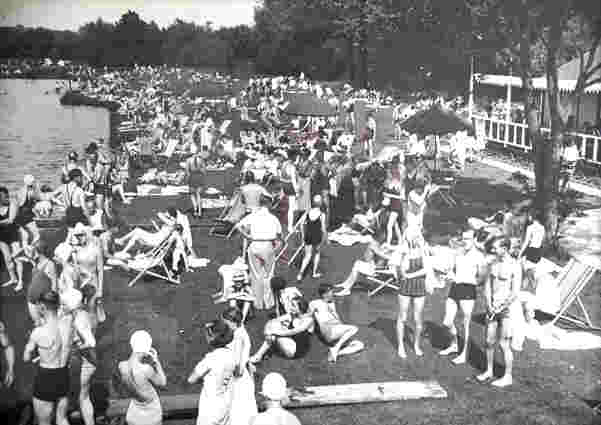|
CAMPAIGN LAUNCHED TO LIFT SWIMMING BAN AT BURY LAKE 
 |
|
| For many years Bury Lake at Rickmansworth was an extremely popular
swimming lake due in part to Rickmansworth being the last stop on the Metropolitan tube line. There used to be a
diving-board, changing facilities, showers etc. But after a fatality 'No Swimming' notices were posted by
the local council over twenty years ago. Since then the lake has been given over to
sailing, wind surfing, canoeing and model-yacht clubs. |

|
|
More council 'mistakes' exposed This Summer (2007), following media reports of a protest meeting at the lake, the Three Rivers District Council (3RDC) returned to an old argument – biological health hazards, not least infestation by Blue Green Algae (BGA) - to justify its position. Most lakes (including those regularly used for swimming e.g. the Heath ponds) and many rivers in the UK are affected by algae at some time during the summer. However, harmful concentrations greatly depend on the weather and can vary from day to day. The World Health Organisation (WHO) has issued clear guidelines which state: A level of 100 000 cyanobacterial (BGA) cells/ml represents a guideline value for a moderate health alert in recreational waters . At these concentrations the Guidelines advises to discourage swimming. Only where there is visible scum (concentrations invariably significantly higher than 100 000 cells/ml) do the Guidelines recommend possible prohibition of swimming and other water contact activities.’ According to information obtained by RALSA under the Environmental Information Regulations the council tested Bury lake for cyanobacterial concentrations in June, August and September 2007 (one set of tests during each of these months). Only the August results showed levels of over 100 000 cells/ml which, according to the WHO, call for some action. The other tests only produced insignificant levels. In addition, the council admitted that they have no documented evidence to indicate that the lake was affected by any other biological contaminants, the existence of harmful snails or evidence that anyone contracted a Leptospirosis type infection (e.g. Weils disease) as a result of taking part in a water sport at Bury lake. Molly Fletcher, campaign organiser took part in a live debate on BBC radio (Three Counties).on Friday 17th August in which she had the opportunity to confront Ann Shaw, the Leader of Three Rivers District Council. She used the familiar old arguments - BGA, Weils disease, snail bites and swan attack to justify the council’s discrimination against the swimmers. Ann Shaw can not even claim that she was ignorant of the irrelevance of her arguments or of the WHO guidelines – the Council did close the lake to all water sports in August and part of September 2003 when BGA concentrations were above the threshold ! Considering the history of this dispute, it is not surprising that even the senior person at the council was using hollow arguments. This is just the latest in an extraordinary string of excuses used by the council which proved to be ‘errors’ or simply unfounded. See below for details. |
|
|
Plain lies or gross incompetence? Responding to a request made to the Three Rivers District Council to re-open the lake to bathers, a Council spokesman first claimed that the lake was closed to swimming some 25 years ago because of the presence of blue-Green algae. Other than that, the Council had no objection to people swimming there. (Water skiing and wind surfing are officially permitted regardless of the risk). However, when our official request was brought before the Leisure and Community Policy Panel (the Panel) on 7th September 2005 it was rejected because: ‘the use of Bury Lake is licensed to various clubs who have access to the Lake. The licences cover the whole of the Lake, therefore, any proposal to permit bathing in a roped off area would require the consent of those licence holders and a variation to the licences. As the licence holders are not willing to have their licences amended, no action is able to be taken at this time. Unilaterally imposing such a variation would be a breach by the Council of its obligations in the licence agreements. It could be liable for damages and costs The Panel was advised that as the licence holders were not willing to have their licences amended, no action would be taken.’ The decision was based on a grossly misleading legal report prepared by Ms Karen Fishwick - then a Landscape Officer with the Council. In fact, it is obvious from the contracts that the rights granted under the licence agreements were: 'in common with others to whom the landlord may from time to time grant rights to use the said lake. We wrote to Cllr Providence, Vice-Chairman of the Panel, alerting him to the great discrepancy between the license agreements and the recommendations presented to the Panel. We received a reply from Ms Fishwick in which she insisted that the advice offered to the Panel was accurate and: 'based on discussions with the legal section and on reading of the licenses themselves' |
|
|
Ms Fishwick’s reply raises a number of questions: a. Having been alerted to the fact that a decision taken by the Panel was based on a flawed report, why did the Vice-Chairman not look into the matter but, instead, referred it back to the person who produced the flawed report in the first place ? b. Did Ms Fishwick really consult the Legal Department? If she did, who was responsible for providing her with the wrong information within that department and what motivated that person to do so? c. Did she really read the licenses? If she did then why was a person who finds it difficult to understand plain English charged with advising the Panel on legal matters? |
|
|
In an attempt to play down the significance of Ms Fishwick's flawed legal report the Council provided the LGO with a
list of additional arguments which, they claim, influenced their decision to reject the swimmer's application. Among
these were the following: Where there is a will there is another excuse A meeting took place on the 2nd June 2006 which, according to all participants, progressed well. We were therefore somewhat dismayed to be told shortly afterwards, that our request to reinstate swimming has been turned down again - this time because we failed to meet a Council’s requirement for lifeguards. It centred on a single email sent by our local representative, well before the 2nd June meeting. in which she expressed a preference for the club to be self regulated – a perfectly reasonable request considering the existence of a High Court judgement on this matter under very similar circumstances. |
|
|
The Council tried to justify its, apparently very rigid, requirement for lifeguards on a rider to a Coroners’ verdict
following a drowning in 1957. This verdict was reached at a time when the lake was open to the general public – not
leased to a self-regulating club, and well before landmark rulings by the House of Lords (Tomlinson v Congleton [2003])
and the High Court (Hampstead Heath Winter Swimming Club -v- Corporation of London [2005]). It makes legal nonsense to suggest that a Coroner’s verdict issued in 1957 overrides a recent High Court ruling on the very specific issue of allowing a self-regulated swimming club to operate in a lake which is under the control of a local authority. | |
|
Even more intriguing is the lack of an explanation as to why this, apparently extremely critical matter, was not even
raised by the Council at the subsequent 2nd June meeting. Finally we were told that, as a result of us not raising the lifeguard issue at the meeting, there was no room for further negotiations. |
|
 We took the dispute with the Council to the Local Government Ombudsman (LGO). We were forewarned that the LGO is run
by ex local councils personnel and that its rulings are heavily biased in favour of the councils but we thought we had a
strong case. The outcome made us realise just how powerful and unaccountable local authorities have become and how
urgent is the need to abolish the current LGO establishment and replace it with a truly independent body.
We took the dispute with the Council to the Local Government Ombudsman (LGO). We were forewarned that the LGO is run
by ex local councils personnel and that its rulings are heavily biased in favour of the councils but we thought we had a
strong case. The outcome made us realise just how powerful and unaccountable local authorities have become and how
urgent is the need to abolish the current LGO establishment and replace it with a truly independent body.The preliminary LGO investigation concluded that Ms Fishwick's blunder was nothing more than a misunderstanding, completely ignored Cllr Providence's (Vice-Chairman of the Panel) failure to challenge Ms Fishwick's report when we alerted him to this 'misunderstanding' and found nothing to suggest that the Council acted dishonestly or discriminated against the swimmers. The LGO did, however establish that Ms Fishwick had no experience in legal matters and that her claim to have consulted the Legal Section must have been another misunderstanding - no one in that department remembered ever being consulted. It also established that the Council official who called, arranged and set the agenda for the 2nd June meeting did not raise the lifeguard issue because he was probably not even aware that it was a requirement!. It unearthed further proof of ignorance, incompetence and bias towards the existing users (see box above for one example) as well as a strong personal input by Councillor Ann Shaw - Leader of the Council - against the proposed granting of a licence to a swimming club shortly before the negotiations came to a sudden and irreversible end. Despite all that, the LGO sided with the Council and terminated the investigation because our representative did not raise the lifeguards issue at the meeting. This, according to the LGO justifies the Council's decision to sever all contacts with us and get away with discriminating against those who wish to swim at the lake.
Please join the campaign to abolish the current LGO system. Local authorities are, by far, those who refuse to
lift swimming bans following the recent changes in the law and even impose new ones. It is partly due to the lack of an
effective, affordable, appeal mechanism that they often treat the public with contempt. As indeed we have seen in this case. | |